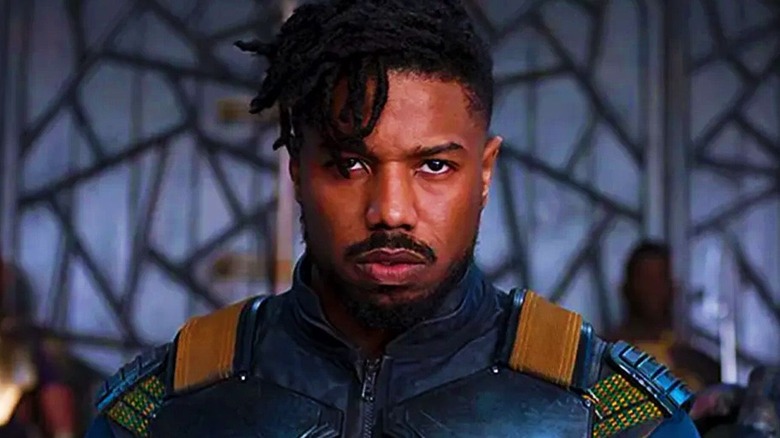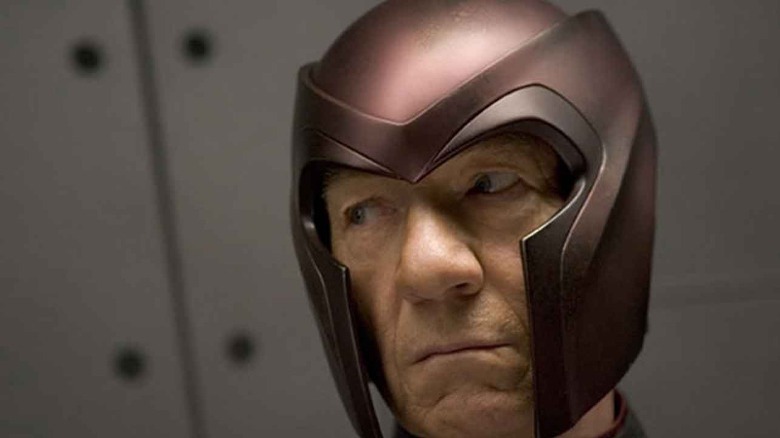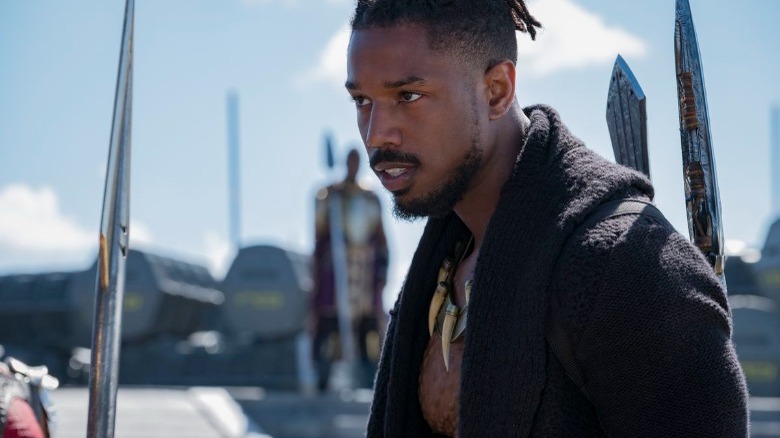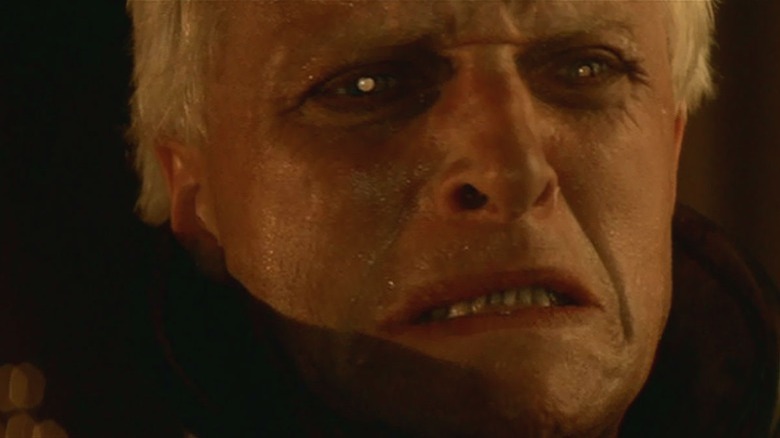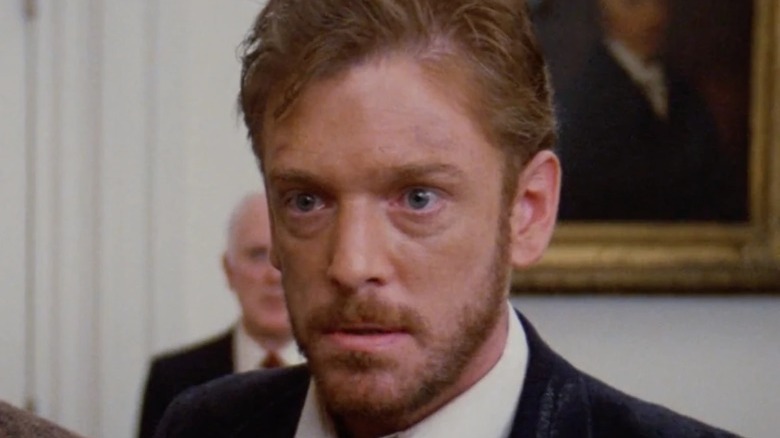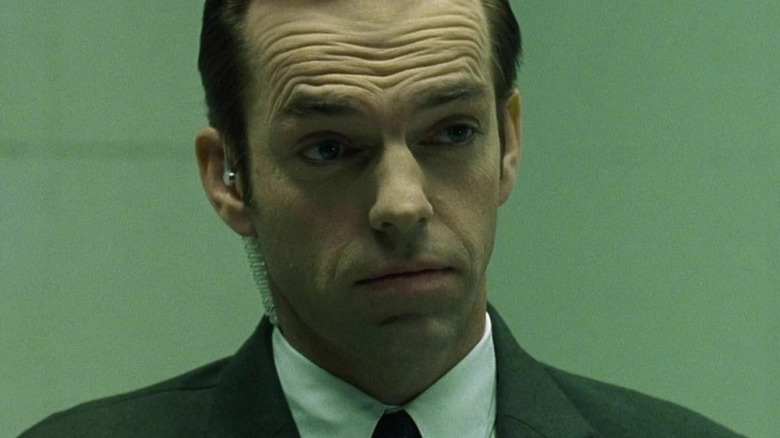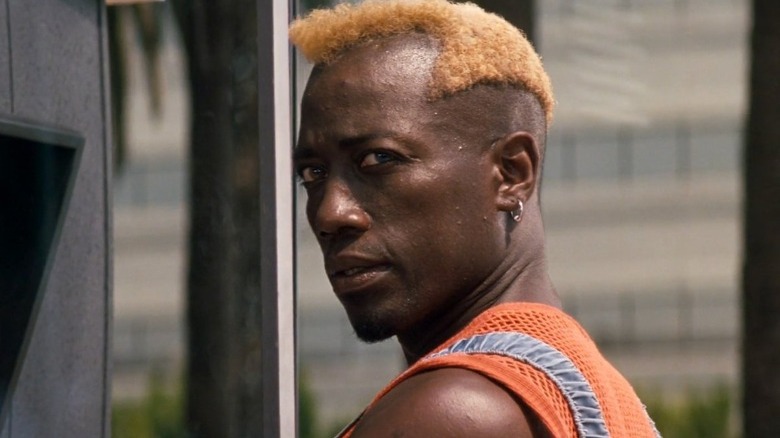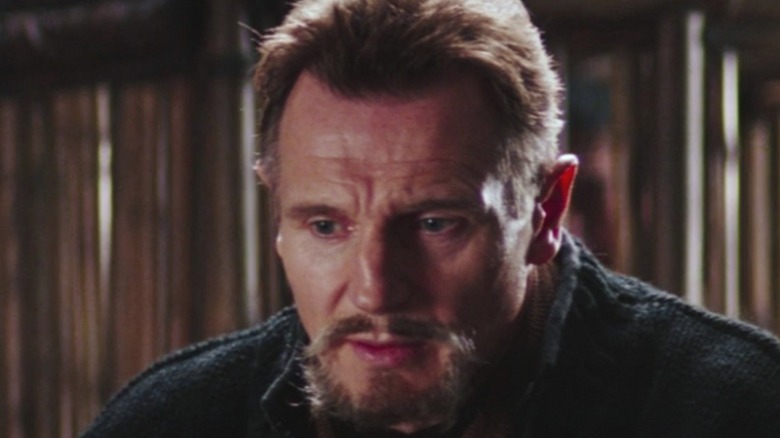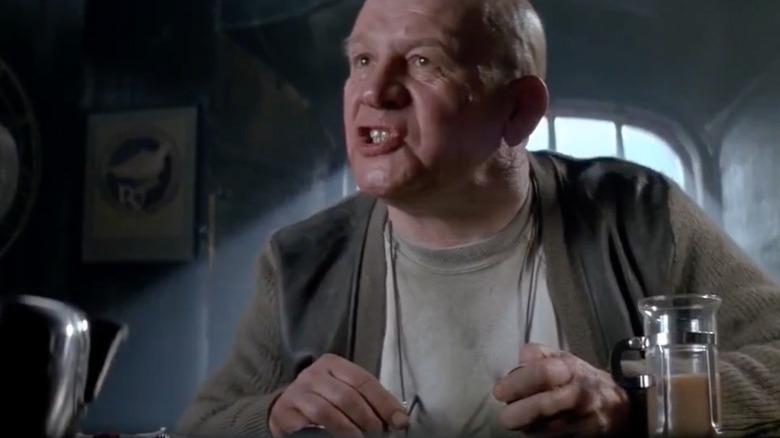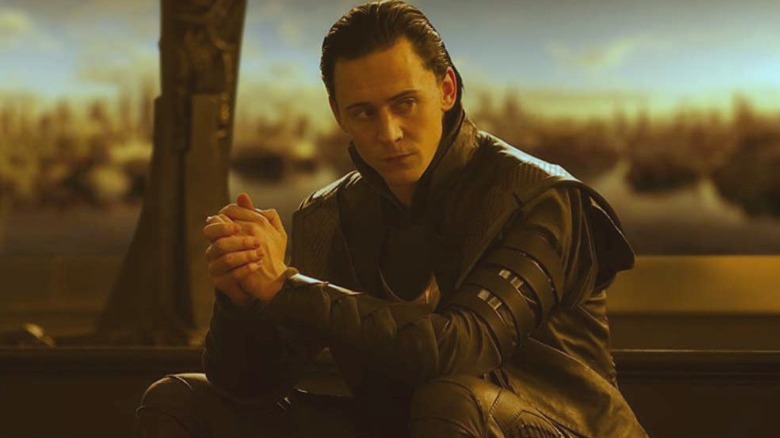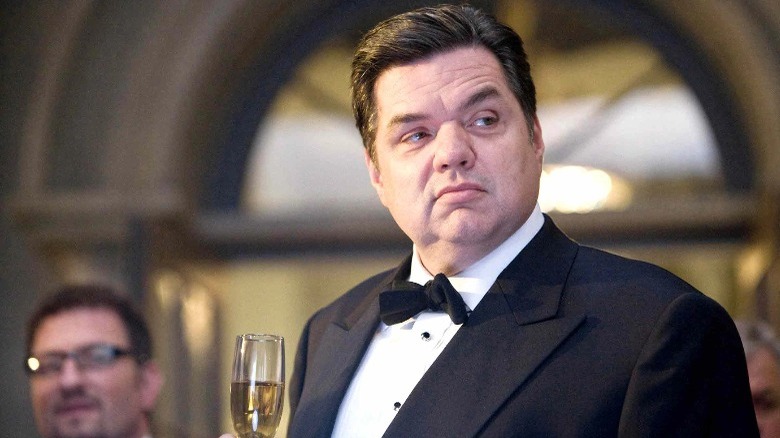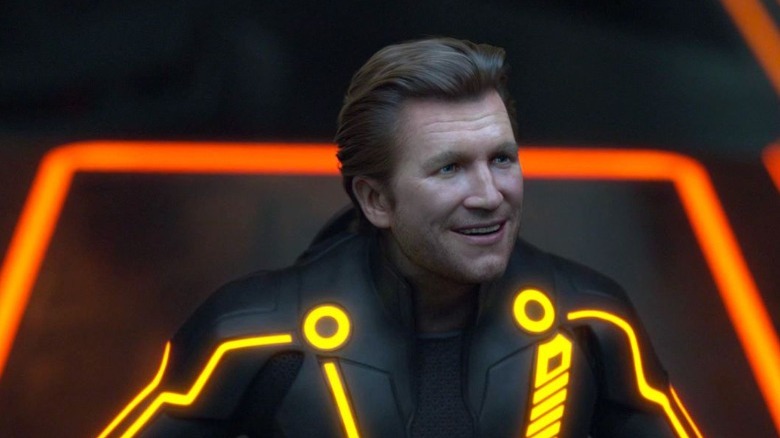Sci-Fi Villains That Were More Right Than We Want To Admit
There are a lot of moving parts involved in making a great villain, or at least a memorable one. The best antagonists have style and charisma, a way of claiming the scene whenever they arrive, but what can make a villain really sizzle is the way they think. If they can get us to empathize with their point of view, even temporarily, then they feel like they have a chance to win.
Not every villain pulls it off. Some are pretty forgettable, but sometimes even wimpy villains make us look back on them and say "Wait, they had a point." Maybe not in the way we thought, or want to admit. Take Principal Rooney from "Ferris Bueller's Day Off." From his point of view, he's got a slacker kid actually hacking into the school computers. We love Ferris, but Rooney is right to be upset with him. That's how real life is, and the movie works because Ferris lets us escape with him on his big day out, but Rooney's got plenty of company in the field of "it sucks, but he's right." Let's meet some of the sci-fi villains that were more right than we want to admit.
Magneto — The X-Men Films
Let's start right off with the man, the myth, the villain who's been proven right ever since he was introduced in 1963's "X-Men #1" by Stan Lee and Jack Kirby. The movies give him a similar platform. Erik "Magneto" Lehnsherr (Ian McKellen and Michael Fassbender) barely survives the Holocaust at Auschwitz in "X-Men: First Class," while being abused and manipulated for his mutant potential. As both Jew and mutant, Erik can't help but be keenly aware of the perils new generations of mutants face every day.
Magneto's friend and nemesis Professor Xavier isn't wrong to try and create a peaceful bond between humans and mutants, but it's never going to be easy. Along the way, Magneto's cynicism proves out as Sentinels claim the possible future ("Days of Future Past"), William Stryker nearly destroys all the mutants in the world ("X2"), and by the time of "Logan" they're almost entirely extinct. That's just the movies, of course. In the comic books, Magneto is still striving to keep his mutant colony, Krakoa, safe from human bigotry.
Killmonger — Black Panther
It's a little weird that Killmonger shares a first name with the other Marvel guy to be right, if actionably questionable. Erik Stevens (Michael B. Jordan) is forced to grow up as an exile from the isolationist country of Wakanda. Instead of the opportunities he could have had as a child of nobility, he lived in Oakland, California during the worst of the economic oppression and violence that was done to Black families. To find a way out, Erik joins the U.S. military where he hones his gifts for combat.
Erik is rightfully furious with the land of his birth. While Wakanda thrives in secrecy, Black cultures across the globe are disenfranchised and oppressed. Wakanda isn't wrong to want to protect itself from colonialism, but as strong as they are now its rulers could do more. Killmonger isn't alone in his point of view. Nakia (Lupita Nyong'o) also fights to do more beyond Wakanda's borders. The difference is that she doesn't choose to overthrow the king and force the realm to support violent revolution across the world. Killmonger does exactly that, without sympathy or hesitation, internalizing the worst lessons the military taught him. In the end, though, he wins: Wakanda is no longer isolated from the world.
Roy Batty — Blade Runner
Roy Batty (Rutger Hauer) is what humanity made of him ... literally, in his case. As a Replicant with an artificially short lifespan, he leaves the throwaway military service he was relegated to and visits Earth, the world of his maker. This is all to look his creator in the eye and demand more of him: more life, more humanity, answers to the biggest questions of his existence. What's more human than questioning the world around us? Who among us would not take the chance to corner our God and get a few shots in?
Batty and his fellow Replicants can be violent, even murderous. In Batty's case, that's what he was made to be. Replicants on Earth are outlaws that can be killed on sight, which doesn't help Batty's antagonistic programming. He kills Tyrell, while Deckard — the man who's been hunting him all along — earns Batty's mercy. This is the moment Roy is more human than human. He turns against his nature and chooses to spare a life. Roy was right to fight for his fellow Replicants.
Emma Russell — Godzilla: King of the Monsters
Godzilla had a fun day out in 2019, thrashing King Ghidorah and meeting up with old friend Mothra, but he only got the chance because a bunch of eco-terrorists decided the planet needed a bit of a reset. We assume at first that Jonah is the main villain here, mostly because he's played by Charles Dance, who always gives great baddie performances. However, it's actually Emma (Vera Farmiga), the ex-spouse of our annoying lead guy Dr. Russell, who's most fixed on releasing the sleeping Titans.
If this scenario was possible in the real world, it's not hard to find the idea appealing. Not because Godzilla and his kin are super cool — they are — but because our planet could use some big ecological help. The risk is in how much human collateral damage the Titans could cause. Emma thinks it could be mitigated, but she also doesn't care too much until her daughter is one of them. Very political of her. In the end, Emma gets a redeeming death and her terrorist acts earn her a final vindication. The Titans are the key to a renewed ecological harmony, so long as Godzilla is in charge. Go, go Godzilla!
Walter Peck — Ghostbusters
With a lineup of top-shelf but eccentric scientists and one incredibly competent regular guy (Ernie Hudson), the Ghostbusters do their part in keeping the world safe from unsettled supernatural phenomena. Yet there's plenty of arrogance on display, mostly due to Venkman's (Bill Murray) abrasive good nature. There's no getting around the fact that they have an unlicensed nuclear reactor under Ghostbusters HQ, and that's a five-star, red alert, public threat.
Walter Peck (William Atherton) doesn't come across as likable but look at it from his point of view: There's a private, unlicensed, unsupervised nuclear reactor under New York City. Yes, it's that simple. It's quite a choice to make the EPA the bad guys here, especially with their history of being undermined by lobbyists and politicians. The EPA is charged with cleaning up hazardous spills, reigning in dangerous forever chemicals tainting our food and water, and, yeah, being the guys with a plan if a nuclear source (whether deliberate or accidental) causes an emergency. Sorry, Venkman, but Peck is right to be upset.
Agent Smith — The Matrix
Agent Smith (Hugo Weaving) has a lot to say about his dislike for humanity. It's a high-class riff on late comedian Bill Hicks, who famously ranted that we were "a virus with shoes." Smith goes on to elaborate on why to Morpheus (Laurence Fishburne), talking about our tendency to exploit and consume all the natural resources available to us. Worse, he tells what seems to be the truth about the Matrix itself. It's depressing and oppressive because it imprisons humans better. We thrive under challenge, so a utopian Matrix quickly fell apart.
Smith is vicious and hateful, far beyond the limits of his programming, but there's plenty of truth in what he says ... at least from his angle. It wasn't the machines that blackened the sky, humans did that with Operation Dark Storm. "The Second Renaissance" short film showed how we scorched the atmosphere in an attempt to halt the feed of solar power to the machines. Worse yet, the machines were a slave class in the pre-"Matrix" years. Their fight to be recognized as more led to violence and, ultimately, war. At least "Matrix Resurrections" saw a new road to peace finally happening. For real, this time.
Simon Phoenix — Demolition Man
The early days of COVID saw a lot of "Demolition Man" jokes. Yeah, nobody's figured out the three seashells, but a mid-pandemic world with limited physical contact and a war for toilet paper found a lot of empathy in this utopian vision of Los Angeles. Except, as Simon Phoenix (Wesley Snipes) figures out, it's a sham.
Simon is not a good person. Actually, he's pretty much a walking nightmare. His murderous rampages and his vendetta against veteran cop John Spartan (Sylvester Stallone) leave no doubt that he's a villain. but he's maybe not the villain. That's Dr. Cocteau (Nigel Hawthorne), the architect of this too-clean future. Sure, it's pretty to look at and you can eat off the asphalt, but Cocteau also wants purity of thought, and he's keen on seeing the last remnants of individualism killed. His plan was to use Simon as a weapon to force the issue. Simon turns on him instead, preferring the chaos of free will. Simon is still far from a good guy when he goes down, but at least it's the first fall of the domino in tearing apart Cocteau's less-than-subtly fascist empire.
Ra's al Ghul — Batman Begins
DC's Gotham has existed since 1939, named in 1940's "Batman #4" by Bill Finger and Bob Kane. It's the black mirror of New York City, a shadowed world of crime and sometimes occult happenings. Sprawling and metropolitan in nature, it's still the Gary, Indiana of fictional cities. Too much of Gotham is economically devastated, fostering a crime world that's the envy of bad guys everywhere.
In Christopher Nolan's "Batman Begins," Ra's al Ghul (Liam Neeson) takes a young Bruce Wayne under his wing. It's not until later that Bruce understands al Ghul's final goal is an escalated form of environmentalism: Gotham cannot be redeemed, so it must be wiped away. While al Ghul's genocide can't ever be applauded, the city has resisted decades, if not centuries, of rehabilitation and redemption. To date, there's no long-term solution, no plan, and no hope for Gotham. Even its would-be heroes like Harvey Dent become warped. Al Ghul's plan sucks, but man, he's not wrong to feel like Gotham just can't be saved.
Superintendant Andrews — Alien 3
Ellen Ripley and the audience know what happens when a Xenomorph cuts loose. Everyone dies horrifically, especially those you care about. Ripley's not in a great place emotionally when "Alien 3" begins its nihilistic story but look at this from the viewpoint of the prison planet's tired warden. Andrews (Brian Glover) has been with the prison since before its decommissioning. He's brusque but relatively fair, considering the nature of his charges.
Then Ripley arrives. That she's female among a small throng of rapists and murderers is just one problem. She's secretive, gives Andrews attitude, and eventually claims some alien critter is going to wreak havoc. He might not believe her, but he does check in with Weyland-Yutani to get her a ride home, later discovering that Ripley is of major interest to them. He doesn't know why. He has little reason to believe the religious angst now disrupting his careful prison routine. All he knows is that Ripley is the heart of the mess. He gets killed by a Xenomorph, sure, but he died doing things right ... from his standpoint, anyway.
Loki — Thor
As "Thor" opens, we meet the young God of Thunder for the first time, and he's kind of a jerk. He's boastful, hammy, far too ready to get into a brawl ... and Odin is about to make him king anyway. His brother Loki is the only person able to see that Thor's not ready for the responsibility. Now, Loki's method of getting everyone to slow down and at least maybe wait on the coronation sucks. It also sets off a cascade effect that ruins his own sanity and sets him up to be the first big villain that the Marvel Cinematic Universe will have to collectively contend with. His plan also lands Thor in a situation where he has to grow up if he ever wants to come home.
Loki has an ironic tendency to be right about a lot of things, but then address it in awful ways. He's right that Odin is a hypocritical king in "The Dark World." He's right that S.H.I.E.L.D. has no real moral superiority in "The Avengers." Heck, even his alternate self is right to question the role of the Time Variance Authority in quashing free will.
Carl Anheuser — 2012
It's unfortunate that sometimes the worst people in history create the necessary effects society needs to continue. Look at Winston Churchill: A key figure in the Allied victory over Hitler in World War II, the rest of his career is marked by racism and political violence. Way on the other side of the spectrum here is the guy that made the survival of humanity possible in the disaster festival "2012."
Carl Anheuser (Oliver Platt) starts off as the White House Chief of Staff, then becomes a key figure in the construction of the Arks and the scientific cover-up that, in his mind, will prevent widespread panic and a scramble to survive the apocalypse. Unfortunately, he's also a classist jerk who installs luxury seats and prioritizes the safety of the elites over the common folk. Bleakly, his cold attitude did help keep the Arks from being too overwhelmed at launch. It takes a brutal humiliation to get him to allow more refugees on board, but at least he relented. Carl Anheuser, you massive turd, you saved humanity.
Clu — Tron: Legacy
The world of "Tron" has lit the imaginations of kids and software engineers since 1982. Debut director Joseph Kosinski ("Top Gun: Maverick") brought back the Grid in 2010 for the delightful, neon-bright "Tron: Legacy." The story also held a reminder that the programs that populate the Grid are still programs. They're going to stick to what they know how to do, and it's a heavy realization to know that Clu wouldn't be the way he is without Kevin Flynn's well-intentioned guidance.
Clu started off right. He was to make the Grid into a utopia, hone it into a perfect system safe from dangerous variables. When spontaneous AI programs — the ISO — come into being, Flynn recognizes them as a new evolution. A computer world is always going to have a hard time with random variables, unlike humans, but Clu is bound by his programming and saw the ISOs as a viral invasion capable of reproducing without user permission. Adhering to his program turns Clue into a fascist. He has no choice. The only person that was in the wrong, Kevin Flynn, knew that and Flynn eventually returns to end poor Clu and his authoritarian regime.
